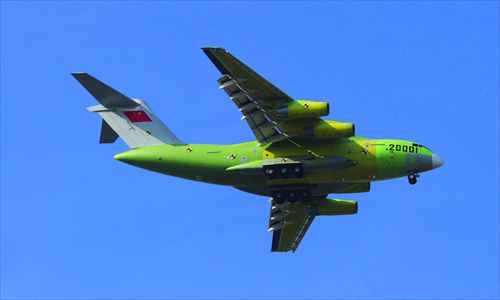Y-20 marks significant milestone in defense
China Saturday carried out a successful test flight of its first heavy transport aircraft Y-20, which attracted attention due to its defense significance. China has made outstanding achievements in developing advanced air force and navy equipment and missiles in recent years. It seems the country's military technological research and development, which mainly started after the 1990s, are witnessing a sudden surge.
The Gulf War and the US bombing of the Chinese embassy in Belgrade jarred China. Competition between powers behind many hot issues in the West Pacific region, such as the Taiwan Strait crisis, increased China's sense of insecurity. Overall economic development and technological progress have provided capital and technological support for the development of China's military industry.
However, compared with some advanced military powers, China is just catching up. According to the most optimistic forecasts, it will take at least 10 years for the People's Liberation Army to close the gap with developed military powers in terms of equipment.
China will see many uncertainties in the next decade. The outside world will increasingly guard against China's military upgrading, possibly risking arms races.
There is also domestic resistance. A growing number of people are calling for a shift in focus from defense to livelihood. Such demands conform to the wishes of external opposition. It's very likely that the two could cooperate in the future.
The development of China's defense industry is based on strong economic support and actual needs. Improved technological capabilities have helped shorten its R&D cycle. Now, the key point is whether China can continue to increase defense input. As long as China is firm and decisive, it will grow into a great power with a modernized defense in the next few decades.
Despite pressure and opposition both at home and abroad, it doesn't make sense for China to slow its pace in developing defense. Western criticisms won't do any actual harm and there is no need for China to mollify the West.
An arms race dragged down the Soviet Union, but China will not follow it. It will never seek unrealistic military comparisons with the US, but has a plan to maintain security and healthy economic development while enhancing its defense capabilities.
The domestic opposition doesn't represent the mainstream of China. These opposing voices shouldn't be allowed to hinder China's future development. Progress in defense is part of China's modernization. It is reasonable for China, a global power facing complicated geopolitical situations, to possess strong defense.
But China is facing a dilemma: Almost none of its new equipment has been tested in war and it's unfeasible to start a conflict just to test its equipment. To raise actual combat capabilities, China needs to conduct more military exercises.
The days when the invention of a new kind of weapon could lead to national euphoria have long gone. The success of the Y-20 only catches the attention of media and military enthusiasts, but it's an important step for China to move forward.
